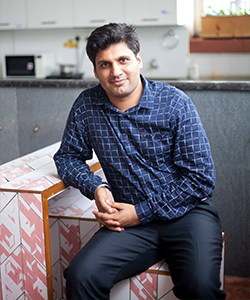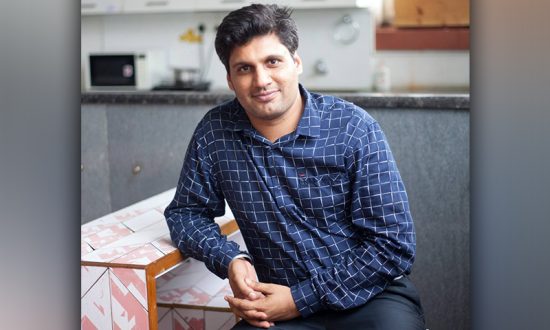With COVID 19 disrupting our lives, now more than ever, we are adapting and moving into the “new reality of an everything-changing world where everyone has to be a changemaker to be able to contribute.” Our lifestyles have changed drastically, economies have taken a blow, many may not have jobs once this crisis is over. However, there will be no shortage of jobs for people open to change and picking up new skills. “The social sector is by far the fastest-growing source of jobs. It is growing employment at 4.4 per cent a year – compared to the 2.2 per cent of the business sector’s fastest-growing element, services,” says Yashveer Singh, Global Executive Director, Ashoka Young Changemakers, an initiative that supports young changemakers, enabling them to be role models in their communities, and give them the skills to thrive in our changing world. In an interaction with CXO Outlook, Yashveer Singh talks about how young people and their skillset needs to change after the pandemic, the relevance of social entrepreneurs, new approaches to creating jobs and many more.
Nasscom says that India’s startup ecosystem has the potential to create up to 12.5 lakh direct jobs by 2025, from 3.9-4.3 lakh direct jobs in 2019. What is your take on the Indian startup ecosystem and its potential to create jobs?
According to a NASSCOM study, India saw addition of nearly 1,300 startups in 2019, adding almost 1.55 lakh jobs that year. Similar to startups that are hubs for innovation and new business models, our social entrepreneurs are individuals with new ideas and innovative solutions to society’s most pressing problems for systems-level change. We are now living in these extraordinary times where the world is moving from being organised around repetition to being organised around change. The world now values contributing to and adapting to change – which is a very different world from the earlier world where success was considered in learning one skill and repeating it for the rest of your life. In this world of change, jobs as we traditionally know it will change and our young people will need to grow up practising to be a changemaker and every institution will need to redefine how success is defined for our young people.
In the wake of COVID-19, millions of jobs are at stake. What is the relevance of social entrepreneurs in this scenario? How can they create more jobs?
Social entrepreneurs play a significant role in the growth of the citizen sector. The social sector is by far the fastest-growing source of jobs. It is growing employment at 4.4 per cent a year – compared to the 2.2 per cent of the business sector’s fastest-growing element, services. When a social entrepreneur develops an innovative solution to solve a social problem for the good of all, she also creates jobs and livelihood opportunities at the community level. Moreover, social entrepreneurs are role models for other changemakers. They spread their ideas by inspiring and encouraging local people in thousands of communities to give themselves permission to become changemakers bringing the social entrepreneur’s idea into their community. Not only do they become changemakers, but they recruit others to work and serve as role models for change-making. All this multiplication of changemakers and their teams is both profound human enrichment and furthers job creation in communities.
Considering that a large chunk of youngsters would prefer to do a lucrative job, what can be the motivating factor to take up social entrepreneurship as a career? Is it possible to make a profit out of such ventures, as there is a notion that social entrepreneurship is all about creating non-profit-organisation?
Our work with social entrepreneurs and young people tells us that the current generation is looking for as much meaning in their work as much as financial stability. The best thing that can happen to a young person is to give themselves permission to see a need and recognise their power to do something about it. The next steps then are identifying a solution and pulling together a team and iteratively evolving the idea until one has changed one’s community. Any young person who has made this journey has – and knows she has — the core power she needs for a good life. There are always needs, i.e., opportunities -and she knows that she has the power to see a need and imagine and build the solution. That is the quest every young person is intuitively on – Mastering how to be a giver which is critical for a good life.
At Ashoka, we define social entrepreneurship as system-changing and mindset changing work towards solving a deep-rooted social problem. The commitment of social entrepreneurs for the good of all is what drives them, and the sources of support mustn’t contradict the central compass that guides them. Social entrepreneurs with big systems-change ideas pursue it for as long as it is necessary until it becomes their new reality. That is what drives them, much more than money.
For a typical social-entrepreneurial venture, how important is financial performance and making profits?
A system – changing social entrepreneur goes beyond the traditional definitions of profits in their work of bringing about change for the greater good of all. While it is important to be financially sustainable to be able to continue the good work, it is paramount that social enterprises do not get pulled away from their purpose towards direct service and away from systems change. This is like the difference between giving someone a fish or teaching a person how to fish versus changing how the fishing industry works in the first place. We need more patient capital in the sector who look for pattern changes and systems and mindset change versus the current enthusiasm for a social enterprise which is very direct service-focused.
What are the difficulties in setting up the processes for a social entrepreneurship venture in India?
Social Entrepreneurs are working on solving deeply rooted social problems using unique approaches, and each of these models presents unique challenges to the entrepreneurs. These include mobilising resources, attracting the right talent, lack of structure and collaboration in the sector, sector-specific and community-level challenges. There is a great need to strengthen the social enterprise ecosystem for organisations to collaborate and leverage each other’s strengths.
In your opinion, what are the significant challenges young social entrepreneurs in India face? How Ashoka YoungChangemakers helps them in overcoming those challenges?
There is a new inequality dividing the world – one where some people have the sophisticated skills to play in this everything changing new world and another where people do NOT have the opportunity to learn and practice these skills. I think the challenges young changemakers are at two levels- individual and institutional level. At the individual level, I believe the first step every adult can take to support a young person in their journey – whenever a young person comes to you saying they saw a problem – encourage them to think about what can be done to solve that problem. This is very essential for her to KNOW and SELF IDENTIFY herself as a changemaker.
At the institutional level, we need to reimagine our education by helping every school, every youth program, every neighbourhood, every organisation to become an everyone a changemaker place. This will mean redefining the success of an institution on the matrix of what proportion of their young people are practising being changemakers.
Hence, one of the fundamental shifts required is in how we define success for our young people and have everyone believe in the power of the Everyone a Changemaker movement. Our Ashoka Young Changemakers are young people under the age of 20 who have challenged the existing youth culture and are strong role models for others and have the potential to impact an entire generation. Ashoka Young Changemakers are powerful co-leaders in the movement, and they have the power to give these extraordinary gift-giving people the power to give.
What are some areas that policymakers need us to promote the development of sustainable social enterprises?
We need to ensure that we create a favourable ecosystem for social entrepreneurship with a bias to pattern-changing work which is key to solving deeply- entrenched social problems. We need to drive more collaboration in the sector across stakeholders which support citizen-sector organisations and the social entrepreneurship sector at large. We also need more conversations between social entrepreneurs and our policymakers as the knowledge that comes from the communities is central to changes in systems and policies. There is a great need for change-making and entrepreneurship for the good of all to become a household phenomenon. So how can policymakers help the larger society by influencing the definition of what success looks like for young people is critical. If every young person grows as a changemaker and as a problem-solver, it helps them not just in finding their own power to change but also changes the way our society functions. We need our policymakers to play a key role in reimagining how our young people are growing up, what success means for them, and to build every organisation/institution as an everyone a changemaker place.
What advice would you give to the social entrepreneurs who are starting?
Working on mindset shift and systems change as social entrepreneurs do, needs patience and creative entrepreneurship. One must find a strong team, allies and sophisticated investors in the sector who look for pattern changes and understand their work deeply. Entrepreneurship can be a lonely journey, so social entrepreneurs must never hesitate to ask for support. As they say, successful social movements can never be created alone.
About Yashveer Singh
 Yashveer has worked with International development organisations on strategy & sustainability and has been instrumental in launching & setting up new projects. Prior to this, he founded a youth non-profit to address talent inequity in the development sector and influence youth culture in India by inspiring, educating, and supporting university students to pursue social innovation and entrepreneurship. For his work, Yashveer has been recognised as one of the Social Entrepreneurs in “Forbes 30 Under 30 Asia” list in the year 2016.
Yashveer has worked with International development organisations on strategy & sustainability and has been instrumental in launching & setting up new projects. Prior to this, he founded a youth non-profit to address talent inequity in the development sector and influence youth culture in India by inspiring, educating, and supporting university students to pursue social innovation and entrepreneurship. For his work, Yashveer has been recognised as one of the Social Entrepreneurs in “Forbes 30 Under 30 Asia” list in the year 2016.
He was also awarded prestigious Youth Action Net, 2012 Fellowship – as 1 of the 20 young social entrepreneurs representing 16 different countries by International Youth Foundation. He was recognised as Global Shaper 2011 by the World Economic Forum. He earned his MBA at Saïd Business School, University of Oxford, where he was the only MBA student to receive Vice-Chancellor Social Impact Award 2014. As the President of Student’s Union BITS Pilani 2006-07, Yashveer co-founded the University VISION 2020 Plan.


